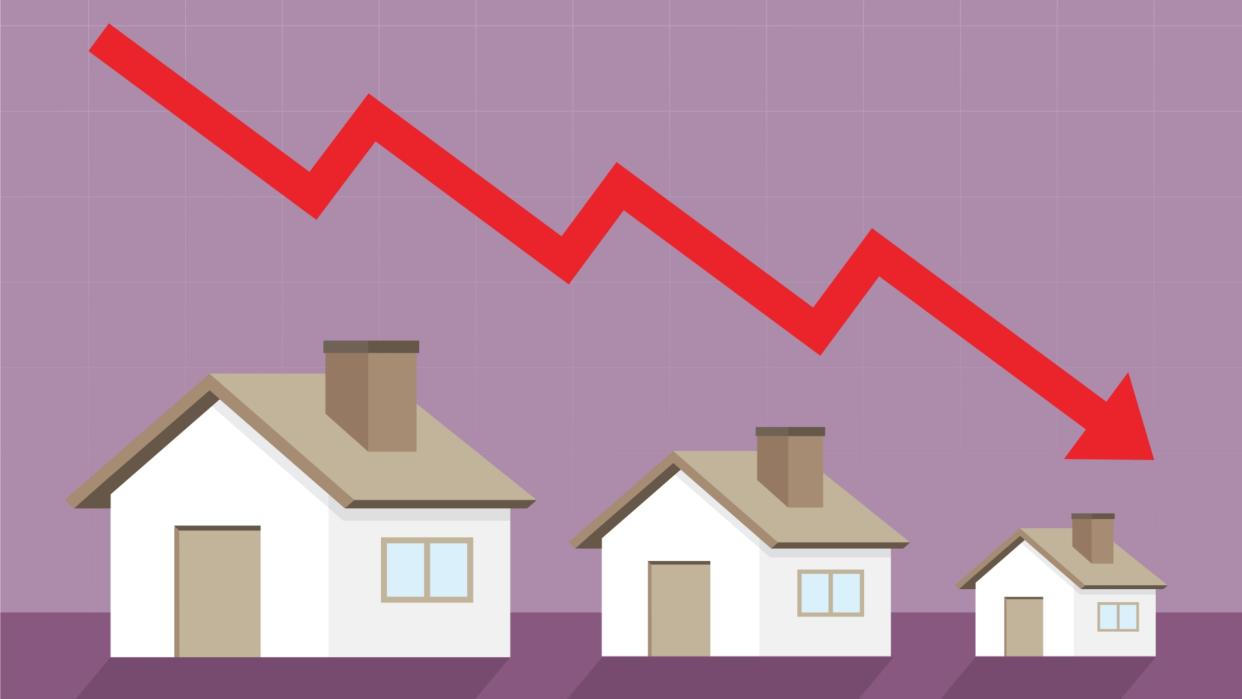Housing Market 2023: 10 Warning Signs of a Housing Crash You Should Watch For

Since the Great Depression, the next most dramatic economic crash of the day came in 2008-09, when the overinflated housing bubble burst, sending the U.S. economy into free fall and devastating millions of Americans who lost equity in their homes — or lost their homes altogether.
Discover: 40 Places Poised for a Housing Crisis
I’m a Real Estate Agent: These Will Be the Best States To Buy Property in the Next 5 Years
The traces of the recession that followed won’t soon be forgotten. While experts are not suggesting that another housing crash is imminent, it might be helpful to homeowners or those interested in buying to know what the warning signs are so you can be prepared.
Unsustainable Price Rises
When home prices rise quickly in a short span without a similar increase in wages, it’s an alarm bell, said Andy Kolodgie, owner of Property Leads.
“I remember early 2000s properties in my neighborhood doubled their value within a year while average income growth couldn’t keep pace with them,” Kolodgie said. “Such discrepancies are often precursors to a correction.”
See: 10 US Cities That Are Running Out of Jobs and Cheap Housing
High Inventory, Slower Sales
A market that’s saturated with homes sitting on the market for long periods signals waning buyer interest, Kolodgie explained. “By 2007, I found myself noticing an abrupt increase in ‘For Sale’ signs around areas that were previously booming.”
Rising Mortgage Rates
One sign to keep an eye out for is already happening: rising mortgage rates. However, the recent increases have largely been an effort by the Fed to slow inflation.
Kolodgie said, “A sudden rise in mortgage rates can discourage new buyers, thereby being one among the factors that reduce demand.”
Larger Economic Indicators
The success of the housing market is dependent on the economy being healthy in general. Kolodgie explained that a larger economic downturn, rising unemployment rates and decreased consumer confidence play pivotal roles in housing crashes.
“I have also seen markets locally crash when major employers shut down or relocated,” he said. “In other words, no one sign prefigures a crash. It’s the interplay of several factors, often in a domino effect that experts such as me keep a vigilant eye on.”
Rental Vacancy Rates as a Precursor
Another sign of a housing crash coming is actually found in the rental market, according to Ritika Asrani, owner of Century 21 St Maarten Real Estate.
“While often overlooked, the rental market can be a harbinger of broader real estate shifts,” she said. “A significant increase in rental vacancy rates may suggest an imbalance between supply and demand. This can be indicative of an oversaturated market where rental properties struggle to find tenants. As renters constitute a substantial portion of the housing market, rising vacancies could eventually put downward pressure on home prices.”
Shadow Inventory Impact
Beyond the visible listings on the market are houses known as “shadow inventory,” or properties that are not officially listed but could potentially enter the market, Asrani said, which can impact the regular market.
“Distressed properties, foreclosures or homes held by sellers waiting for better market conditions contribute to this shadow inventory,” she said. “A sudden influx of these properties can intensify market competition and exert downward pressure on prices.”
Social Media Sentiment Analysis
The very savvy person can scour social media for hints and clues, Asrani said.
“In the age of social media, sentiment analysis can offer unique insights into public perception and confidence in the real estate market,” she said. “Analyzing online conversations, comments and discussions can reveal subtle shifts in sentiment. A sudden increase in negative sentiments, concerns about affordability or discussions about market instability might precede broader market awareness. This real-time, qualitative data can serve as an early warning system for potential market shifts.”
External Factors
Joshua Martin, licensed Realtor with Atticus Home Buyers, said, “Sometimes, it’s not just market conditions but also external factors like natural disasters, changes in zoning regulations or major infrastructure projects that can impact property values.”
He said it’s important to stay informed and be aware of what’s happening in your area.
“That’s where a knowledgeable Realtor comes in handy,” he said. “They can provide you with the guidance and expertise you need to navigate the market and make informed decisions.”
Increase in Foreclosure Rates
One of the most realistic signs of an impending housing market crash is a significant increase in foreclosure rates, according to Alyssa Huff, a real estate specialist at Sell House.
“When people are unable to pay their mortgages and foreclosures rise,” she said, “it signals financial struggles on a large scale.”
The way to find this information out is to closely monitor foreclosure filings and activity, both nationally and in your area.
“Comparing current foreclosure numbers with previous months and years offers valuable insights,” Huff said. “It’s crucial not only to look at national trends but also to consider local variations; a decreasing national rate might mask increasing rates in specific regions. Such local spikes indicate vulnerability and financial strain, often foreshadowing broader economic challenges and a potential housing market downturn.”
A Combination of Factors
In essence, according to Martin, a housing crash is not imminent due to just one sign, but a combination of factors that you need to keep an eye on.
“For example,” he said, “if you notice a decline in the local economy, an oversupply of homes in the market, increasing foreclosure rates or a slowdown in home sales, these could be red flags. It’s like putting together puzzle pieces to get the full picture.”
More From GOBankingRates
This article originally appeared on GOBankingRates.com: Housing Market 2023: 10 Warning Signs of a Housing Crash You Should Watch For
